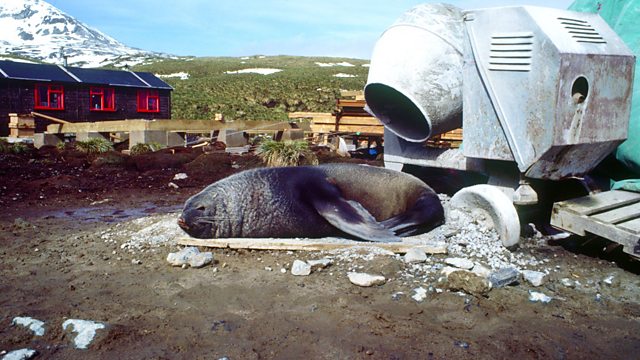Main content
Are We Getting Used to Less Wildlife?
Each generation has its own impression of normal wildlife abundance - a new baseline. But if abundance is falling does that mean we just get used to living with less?
The diversity and abundance of wildlife is declining across the world. As people grow older they notice the changes but for each new generation the baseline is reset. Is each generation is getting used to living with less and less wildlife? With so many other distractions do young people today notice the wildlife around them? Monty Don explores whether shifting baselines are a problem for conservation or simply inevitable in a system already subject to natural fluctuations.
Last on
Mon 29 Sep 2014
21:00
Βι¶ΉΤΌΕΔ Radio 4
More episodes
Previous
Professor Kevin Gaston

Kevin Gaston is the inaugural Director of the (ESI) and Professor of Biodiversity and Conservation at the University of Exeter.
The ESI conducts cutting-edge research into solutions to problems of environmental change, thereby enhancing people’s lives through improving their relationships with the environment. It has staff drawn from a variety of backgrounds - including mathematicians, engineers and environmental, political and social scientists - reflecting the need for an interdisciplinary approach to such solutions.
An ecologist with diverse interests, a major strand of Gaston’s research is concerned with the health and well-being benefits that people gain from natural environments. This program of work includes determining the breadth and form of these benefits, the components of nature that provide them, the dynamics of this provision, and how the provision can most effectively be improved.
Twitter:
The ESI conducts cutting-edge research into solutions to problems of environmental change, thereby enhancing people’s lives through improving their relationships with the environment. It has staff drawn from a variety of backgrounds - including mathematicians, engineers and environmental, political and social scientists - reflecting the need for an interdisciplinary approach to such solutions.
An ecologist with diverse interests, a major strand of Gaston’s research is concerned with the health and well-being benefits that people gain from natural environments. This program of work includes determining the breadth and form of these benefits, the components of nature that provide them, the dynamics of this provision, and how the provision can most effectively be improved.
Twitter:
Professor Aubrey Manning, OBE

Professor Aubrey Manning is recognised as one of the country’s leading authorities on animal behaviour.
He rose from Assistant Lecturer at the University of Edinburgh to become a Professor of Natural History at the university in 1971, a position he retained until retirement in 1997.
Manning's storytelling skills have led to him presenting television programmes such as Βι¶ΉΤΌΕΔ2’s Earth Story and Talking Landscapes and he has worked on a range of radio output including recent Radio 4 programme The Sounds of Life, in which he explores natural sounds ranging from the seabed to the jungle.
He is a Fellow of the Royal Society of Edinburgh, holds honorary degrees from Toulouse, the Open University and St.Andrews, and was awarded an OBE in 1998.Β He has been Chairman of the and a and .
He rose from Assistant Lecturer at the University of Edinburgh to become a Professor of Natural History at the university in 1971, a position he retained until retirement in 1997.
Manning's storytelling skills have led to him presenting television programmes such as Βι¶ΉΤΌΕΔ2’s Earth Story and Talking Landscapes and he has worked on a range of radio output including recent Radio 4 programme The Sounds of Life, in which he explores natural sounds ranging from the seabed to the jungle.
He is a Fellow of the Royal Society of Edinburgh, holds honorary degrees from Toulouse, the Open University and St.Andrews, and was awarded an OBE in 1998.Β He has been Chairman of the and a and .
George Monbiot

George Monbiot is an environmental campaigner, a regular columnist for the and the author of several best selling books, including , and , as well as the investigative travel books , and . His latest book is
Twitter:
Twitter:
Professor EJ Milner-Gulland

works on improving the design of conservation interventions so that they work better for both poor people and wildlife in developing countries.
She is the Director of Β (GCEE) initiative and runs the (ICCS) research group.
ICCS works at the interface of social and ecological systems, using a range of approaches to address key issues in current conservation. TheΒ underlying philosophy is that in order to make progress the incentives, pressures and challenges faced by individual decision-makers must be considered.
Twitter:
She is the Director of Β (GCEE) initiative and runs the (ICCS) research group.
ICCS works at the interface of social and ecological systems, using a range of approaches to address key issues in current conservation. TheΒ underlying philosophy is that in order to make progress the incentives, pressures and challenges faced by individual decision-makers must be considered.
Twitter:
Broadcasts
- Tue 23 Sep 2014 11:00Βι¶ΉΤΌΕΔ Radio 4
- Mon 29 Sep 2014 21:00Βι¶ΉΤΌΕΔ Radio 4
Learn about habitats with The Open University
Explore the twists and connections of natural life in four different UK habitats.

